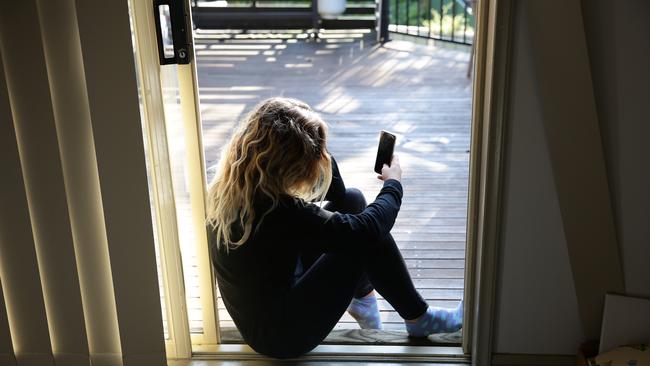Your kids are probably sexting. Pretending they’re not isn’t helpful
PREACHING abstinence or keeping your head in the sand will not help your kid navigate the minefield of sexting, writes Jane Fynes-Clinton.

Rendezview
Don't miss out on the headlines from Rendezview. Followed categories will be added to My News.
WHEN confronted with the visual, uncomfortable truth, most parents say the same words: my child would never do that.
But here is news: they would and probably have. And no, they are not OK.
Taking, sending, keeping and sharing sexually explicit images is all the rage.
A recently released analysis of offences dealt with under the Queensland legal system by the Sentencing Council found that in the 10 years to the end of June 2016, 3035 offenders responsible for more than 8000 child exploitation material matters were dealt with.
It is terrible, in itself.
But nearly half of these people who had, made or shared child exploitation material were kids themselves. And they were just the ones who were caught.
Some of the lewd acts involved primary schoolers: little kids who in any other era in Australia were playing chasey, but these days were taking provocative photos of their own or others’ private parts instead.
Under Queensland and most other state law, the age of consent for sex is 16, but because people use phones and the internet to do the sexy stuff, federal law takes hold and sexters under 18 are breaking the law.
To be clear: it is illegal to possess, take or distribute sexual images of a person under 18, even if that person is you.
Pity the poor police. They don’t want to make criminals out of kids with a partiality for porn and nearly all sexting kids in the past 10 years were given a caution or ordered to attend conferencing. How distressing for them, and the waves of offenders keep coming.
Statistics out of the UK this month show children whose sexting has put them on police radars average 13 or 14 years old. The Queensland analysis showed the average age here was a bit over 14, which is not a great deal better.
The BBC revealed earlier this month that a five-year-old boy became the youngest child in Britain to be investigated for sexting after sending an intimate picture of himself to another child.
In Queensland, 45 per cent of the underage sexting offenders pulled up are girls. Of the average adult offenders, 98.5 per cent were male.
Terrifying, isn’t it?
This is childhood as we have never known it. Boys and girls are both at it. Sexts are the new duck-faced selfies.
Seemingly, everyone is sexting.
The Great Imam of a leading hard line Muslim organisation in Indonesia Rizieq Shihab was charged with it recently and fled the country.
A Texas judge Hilary H. Green was suspended this month amid allegations she sexted a lover from her courtroom.
It is saucy stuff between consenting adults but it is revolting when it involves children, and somehow more shocking when the purveyors of the imagery are the ones in front of the camera.
Digital native kids are savvy enough to know that when they hit send, the material is out there and they have relinquished control of it. But they are possibly not mature enough to know if what they do is right.

An Indiana State University study last year showed that in the US, one in four people had shared explicit messages with others even when they said they wouldn’t, and with an average of three more people. It is just so easy to share, as children know.
At the core of the problem is that pornography is easily accessed, far more explicit than it once was and utterly socially accepted. It is out of the closet and is in full voice and colour.
Kids who get their relationships and sex education from porn think it is fine to ask for or take nude photos.
Boys think girls like being dominated and belittled, as they are so often in the clips they see online. Girls think that is normal too.
We have to help them help themselves, because in the digital realm at least, adults have been shown to be unable to keep them safe.
The start of turning the tide is facing facts: it is happening and no matter how much you love them, your kids are possibly doing it, long before you think they are even interested in sex.
Childhood is fleeting and getting so much briefer.
It is not helpful to derail discussions by turning the topic quickly to paedophiles and predators. Start with children and frame the conversation around respect.
Preaching abstinence does not work — the problem has accelerated since the “sexting” term was developed in 2005 — so surely harm minimisation is key. Frank discussions without shame are long overdue.
And messages around boundaries, respect and consent must be more openly explored if our young people are to have functional sexual relationships in adulthood.
Bless them and their fleeting innocence.
Dr Jane Fynes-Clinton is a journalist and journalism lecturer at the University of the Sunshine Coast.


